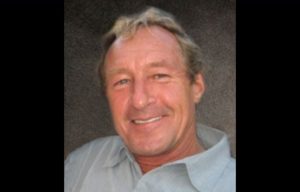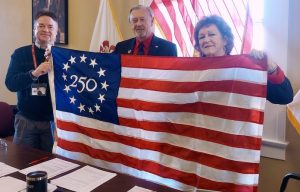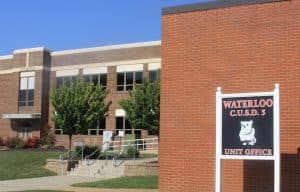Columbia revisiting biz district
The City of Columbia will hold another public hearing on a proposed business district in the northern part of the city.
During its Feb. 20 meeting, Columbia City Council set the hearing date, which will be held as part of the March 4 council meeting beginning at 7 p.m. at City Hall.
A public hearing about the business district on Feb. 5 drew a sizeable crowd and lasted over an hour.
Based on feedback, there have been significant changes to the business district plan, which requires the city to hold another public hearing on the topic.
The district will be up for discussion only on March 4, with no vote to be taken at that time, although Columbia City Administrator Doug Brimm noted it is possible action may be taken during the March 18 council meeting.
Changes to the plan include adding three properties adjacent to Sand Bank Road as well as two lots on Southport Drive which were “inadvertently omitted,” Brimm said.
“There were updates made to correct various references,” Brimm continued, adding there was a focus on “removing the statutory eminent domain authority that I believe may have caused some initial alarm.”
During the Feb. 5 meeting, three residents with property on Bridgeview Drive expressed concern with their properties being included in the proposed district.
During the meeting last Tuesday, Brimm said the residential lots will remain in the proposed district “simply because of the overarching thought they are not being impacted through their inclusion. There are no additional property taxes or anything that are imposed on those properties. If it were a situation where there were development interest in those properties, it would ultimately be up to the individual homeowners as to what direction they wanted to take with regards to their specific properties.”
Ward III Alderman Steve Holtkamp asked if residential properties in the district boundaries would be subject to potentially higher property taxes.
Columbia City Attorney Terry Bruckert noted a hypothetical increase in valuation and taxes would happen whether or not a business district was in place.
“We thought it was a safer route to leave (the properties) in because no one’s being forced to sell. No one’s being targeted there,” Brucker said. “In my 20 years of experience with this particular law, property values will always be better with (a business district) in place. It never hurts property values. If you’re going to err, err on the side of inclusion, not exclusion.”
There are 13 residential properties included in the proposed district on Bridgeview Drive.
Holtkamp asked if all property owners had been notified prior to the last hearing.
“People ignore a lot of things until after the fact,” Holtkamp said. “I wouldn’t want my house to be in a business development district, personally,” he concluded, saying he would like all property owners notified.
Brimm said in this instance, the city was not obligated to notify residents in writing but said there would be no issues sending a letter of notification to relevant property owners ahead of the March 4 hearing.
In other business, the council discussed a potential amendment to Columbia’s zoning ordinance in regard to “short-term rentals.”
Brimm explained the city currently only has language regulating traditional bed and breakfast establishments, but nothing about the increasingly popular short-term rentals through companies such as Air BNB and VRBO.
The city had discussed an uptick in such activity in 2022, but noted there was nothing in place to prevent property owners from renting.
He also explained the city has developed a way to discover whether or not a property is being used through a short-term rental site – a problem which had been a roadblock to enacting code revision – although he said he wished to exercise discretion while discussing the method.
Brimm said the city had researched an authority granted through state statutes which allows for “defining, preventing and abating nuisances within the city… and to impose restrictions on the short-term rental properties.”
Brimm also said the city has been contacted by residents who suspected neighboring properties had been using their homes as short-term rentals.
Currently, there are “roughly 13 active non-bed and breakfast (rentals) within city limits,” Brimm said.
With “very little clarity” and bed and breakfast establishments being the only businesses specified in city ordinances, Brimm explained Columbia “cannot enforce occupancy codes” for other short-term rental activity.
The proposed amendments would provide regulation, licensing and inspection guidelines to apply to all short-term rentals in three classes: owner occupied, non-owner occupied and bed and breakfast.
The amendments as presented would limit all short-term rental properties to the C-2 business zoning district and would provide clarity about how they can be established through the special-use permit process.
In addition to “bolstering the language” to clearly define all three types, code amendments would potentially set a cap of five owner-occupied and five non-owner occupied licenses.
Brimm said the number was based on what other municipalities in the area are doing, but said the amendments could be “tweaked” or changed based on alderman input.
Mayor Bob Hill said it was “a step in the right direction,” pointing out the unfair financial advantage Air BNB or VRBO operators have in addition to an inability for the city to monitor potentially problematic activity.
Ward II Alderman Michael Lawlor spoke in favor of regulation, saying it is needed to safeguard residential areas.
“You live in town and you’ve got your house and family and all that goes with it, and all of a sudden you don’t know who’s next door to you,” Lawlor said. “We’re close to an urban area. You could have a great big party, you could have some bad people (using short-term rental) for two days, three days, four days, and you don’t know anything about it. Next week it’s somebody new. I don’t want to see anything like that in our district at all.”
Ward I Alderman Jay Riddle was opposed to the cap.
“It’s something we’ll have to look at,” Riddle began. “For the people who are doing it correctly and will do it correctly… you can’t take all the bad apples and say ‘this is what’s going to happen.’”
The topic is expected to be on the March 4 council agenda.
At the beginning of last Tuesday’s meeting, Columbia Police Chief Jason Donjon gave a report about the department.
He mentioned yearly totals which had been reported in the Jan. 17 issue of the Republic-Times.
Although overall crime numbers were down, Donjon noted arrests were up.
He said the surveillance cameras purchased by the city were “very helpful,” and he will be budgeting for more to possibly be installed along Main Street in the business district.
Another point of emphasis for Donjon was a significant reduction in dangerous vehicle crashes at the intersection of Route 3 and North Main Street.
Donjon said that in 2022, there were 11 serious crashes at the intersection which resulted in 11 total injuries. He noted the actual number of accidents at the intersection was higher, but minor incidents were not included.
In the past year, Donjon reported there have only been two serious crashes at the intersection and zero hospitalizations.
Donjon credited the shifting of the left turn lanes as well as the flashing yellow left-turn signal which had been installed.
City Engineer Chris Smith later added his original improvement plan for the intersection had been denied, but gave credit to Donjon for making the improvements a reality.
Smith said Donjon submitted surveillance video of three crashes at the intersection which occurred between Christmas and New Year’s Eve 2022.
Smith said Donjon “helped get it going… Those videos painted a picture you really couldn’t describe to someone sitting in their office.”
Once the videos were submitted, Smith said “shortly thereafter, (the city) got a phone call… It was (Donjon’s) persistence that really helped push that through.”






